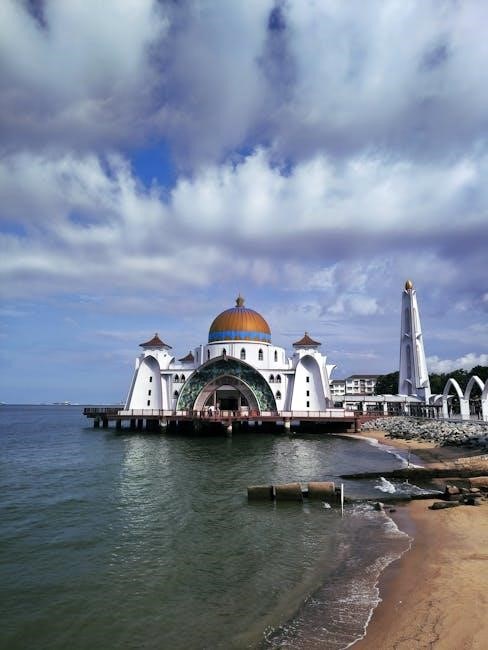
Dream interpretation in Islam is a revered practice, deeply rooted in Quranic teachings and the prophetic traditions. Dreams are classified into three categories: truthful, self-talk, and jumbled, with truthful dreams considered divine guidance. The Quran and Prophet Joseph’s expertise highlight their significance, offering insight into spiritual and worldly matters.
1.1 The Importance of Dreams in Islamic Culture

In Islamic culture, dreams hold significant spiritual and cultural value, often seen as a means of divine communication. They are believed to provide guidance, comfort, or warnings, influencing both personal decisions and communal life. The classification of dreams into truthful, self-talk, and jumbled highlights their varied roles in Islamic tradition. Scholars like Ibn Sirin have further enriched this understanding, making dream interpretation a vital tool for spiritual growth and everyday life.
1.2 The Role of Dream Interpretation in Islamic Mysticism
Dream interpretation plays a pivotal role in Islamic mysticism, particularly within Sufism. Sufis view dreams as a portal to the spiritual realm, offering insights into divine will and inner truths. The practice is deeply rooted in the belief that truthful dreams (ruyā) are a form of divine communication. Scholars like Ibn Sirin and Sufi mystics have elaborated on this, using dreams to guide spiritual growth, resolve inner conflicts, and connect with the divine. This tradition remains a cornerstone of Islamic mystical practices.
Historical Background of Dream Interpretation
Dream interpretation in Islam traces its roots to pre-Islamic practices and the Quran, with Prophet Joseph’s expertise in dream analysis being a pivotal milestone. The tradition evolved through Islamic scholars and mystics, blending spiritual insights with cultural wisdom to form a unique system of understanding divine and symbolic imagery.
2.1 Pre-Islamic Influences on Dream Interpretation
Pre-Islamic cultures, such as ancient Greeks and Egyptians, developed sophisticated systems for interpreting dreams, often linking them to divine messages or future events. The works of Artemidorus, a Greek oneirocritic, influenced later traditions, including Islamic practices. Jewish rabbis and Christian theologians also contributed to dream interpretation, with shared symbols and meanings across Abrahamic traditions. These pre-Islamic practices laid a foundation for the rich tapestry of dream analysis that would later evolve in Islamic thought and mysticism.
2.2 The Quranic Perspective on Dreams
The Quran emphasizes the spiritual significance of dreams, particularly highlighting Prophet Joseph’s expertise in interpretation as a divine gift. Surah Yusuf underscores the importance of truthful dreams (ruya), which are considered divine messages. The Quran also distinguishes between dreams inspired by Allah and those influenced by Satan, providing a theological framework for understanding their origins and purposes. This Quranic foundation shapes Islamic views on dreams as a means of divine communication and guidance.
2.3 The Role of Prophet Joseph in Islamic Dream Interpretation
Prophet Joseph holds a prominent place in Islamic dream interpretation, as his expertise in interpreting dreams is divinely inspired. The Quran narrates his ability to decipher dreams, such as those of the King of Egypt, showcasing his gift as a divine trust. His story in Surah Yusuf highlights the importance of truthful dreams (ruya) as a means of divine communication, reinforcing the Islamic belief in dreams as a source of divine guidance and wisdom.

Key Figures in Islamic Dream Interpretation
Key figures like Ibn Sirin and Prophet Joseph are pivotal in Islamic dream interpretation, offering profound insights and methodologies that reflect cultural and spiritual values.
3.1 Ibn Sirin: The Renowned Islamic Dream Interpreter
Ibn Sirin, a prominent Islamic scholar, is celebrated for his authoritative Dream Dictionary, which remains a cornerstone of Islamic dream interpretation. His work intricately explores dream symbolism, blending cultural and spiritual insights. As a master of Islamic mysticism, Ibn Sirin’s interpretations are sought by scholars and seekers, offering profound understanding of divine messages and human experiences through dreams, making his contributions invaluable in the realm of Islamic esoteric knowledge.
3.2 Contributions of Other Islamic Scholars to Dream Interpretation
Beyond Ibn Sirin, other Islamic scholars like Ibn al-Qayyim and Al-Baghawi have enriched dream interpretation. Their works provide authentic insights, emphasizing the distinction between divine and satanic influences. These scholars’ contributions offer deeper understanding of dreams’ spiritual dimensions, guiding believers to discern meaningful visions and align them with Islamic teachings, thus preserving the integrity and wisdom of this sacred practice for future generations.
Classification of Dreams in Islam
In Islam, dreams are categorized into three types: truthful (ruyā), self-talk, and jumbled (adghath al-ahlam). This classification helps believers discern divine guidance from satanic influences or random thoughts.
4.1 Truthful Dreams (Ruya)
Truthful dreams, known as ruyā, are considered divine inspirations from Allah. They serve as guidance, offering encouragement or warnings, and often carry symbolic or literal meanings. These dreams are clear and impactful, reflecting spiritual truths or future events. According to Islamic teachings, ruyā are a blessing, requiring proper interpretation by knowledgeable scholars. Ibn Sirin, a renowned interpreter, emphasized their importance and the need to distinguish them from satanic illusions or random thoughts.
4.2 Self-Talk Dreams

Sometimes referred to as “dreams of the self,” these are reflections of a person’s thoughts, emotions, or subconscious mind. They stem from personal experiences, desires, or fears, and carry no divine or prophetic significance. Islamic scholars caution that such dreams should not be overemphasized, as they lack spiritual weight. Proper interpretation involves recognizing their personal nature and avoiding confusion with truthful or prophetic visions.

4.3 Jumbled Dreams (Adghath al-Ahlam)
Jumbled dreams, or Adghath al-Ahlam, are unstable and lack coherence. They are often dismissed as meaningless, stemming from worldly distractions or Satan’s influence. Islamic scholars emphasize that such dreams should not be dwelled upon, as they carry no divine or prophetic significance. Believers are advised to seek refuge in Allah and avoid overinterpreting these confusing visions, focusing instead on clear, truthful dreams that offer spiritual guidance and clarity.

The Role of Sufism in Dream Interpretation
Sufism regards dreams as a bridge to the spiritual realm, offering mystical insights and inner purification. Sufis believe dreams provide divine messages, guiding believers toward spiritual growth and closeness to Allah.
5.1 Sufi Perspectives on Dreams and Spirituality
Sufis regard dreams as a bridge to the spiritual realm, offering mystical insights and inner purification. They believe dreams facilitate divine communication, guiding believers toward spiritual growth and closeness to Allah. Sufi mystics often interpret dreams as symbolic messages, reflecting the dreamer’s inner state and divine will. This practice, rooted in Islamic mysticism, emphasizes the role of dreams in accessing higher states of consciousness and achieving spiritual enlightenment. Sufis also use dreams to discern hidden truths and gain guidance for their spiritual journeys.
5.2 The Use of Dreams in Sufi Mystical Practices
Dreams play a vital role in Sufi mystical practices, serving as a means to connect with the divine and gain spiritual insight. Sufis believe that dreams can reveal hidden truths, offer guidance, and inspire introspection. They often engage in practices like meditation and reflection to interpret dreams, using them as a tool for self-purification and spiritual growth. Dreams are also seen as a way to receive divine inspiration and strengthen one’s relationship with Allah, fostering a deeper sense of spirituality and inner peace.

Practices and Etiquettes Related to Dreams
Muslims are taught to approach dreams with mindfulness, sharing them only with the pious to avoid negative interpretations. Seeking guidance from scholars is also highly encouraged for proper understanding.
6.1 Seeking Guidance for Dream Interpretation
In Islam, seeking guidance for dream interpretation is a collective effort, emphasizing the importance of consulting knowledgeable scholars. The dreamer should share their vision with someone who maintains Taqwa (piety) to ensure proper understanding. This practice prevents misinterpretation and aligns the seeker with divine wisdom. Scholars, well-versed in Islamic teachings, provide insights based on Quranic principles and prophetic traditions, ensuring the interpretation remains faithful to Islamic values.
6.2 The Etiquette of Sharing Dreams in Islam
In Islam, sharing dreams is governed by specific etiquette to avoid misinterpretation. It is recommended to share dreams only with trustworthy individuals, especially those with religious knowledge. This precaution ensures that the dream is interpreted correctly and malicious spirits do not exploit it. Additionally, one should avoid sharing disturbing or negative dreams publicly to prevent spreading evil or causing unnecessary fear.
Cultural and Social Functions of Dreams
Dreams in Islam serve as a cultural and social bridge, offering divine guidance and shaping communal values. They inspire spiritual growth and provide insights into societal norms, fostering unity and moral direction. Dreams are valued as a means of connecting with the divine, influencing decisions, and strengthening faith, thus playing a pivotal role in Islamic culture and daily life.
7.1 Dreams as a Source of Divine Guidance
In Islam, dreams are regarded as a means of divine communication, offering guidance and insight into spiritual and worldly matters. The Quran emphasizes the role of prophetic dreams, as seen in Prophet Joseph’s story, where dreams were used to uncover future events and provide wisdom. Truthful dreams, known as ruya, are believed to originate from Allah, serving as a source of comfort, warnings, or divine inspiration. They help believers align their actions with God’s will, reinforcing faith and moral direction.
7.2 Dreams in Shaping Social and Religious Values
Dreams have played a significant role in shaping Islamic social and religious values, offering moral and ethical insights; They are believed to inspire righteous behavior and reinforce cultural norms, fostering a sense of community and shared identity. Sufi mystics, in particular, have utilized dreams to explore spiritual dimensions, influencing religious practices and societal expectations. This emphasizes the profound impact of dreams on both individual and collective Islamic consciousness, guiding believers toward ethical living and spiritual growth.

Modern Approaches to Islamic Dream Interpretation
Modern approaches integrate technology and digital platforms, offering accessible dream interpretation resources while maintaining Islamic authenticity. Apps, websites, and forums now provide contemporary tools for understanding divine messages.
8.1 Contemporary Resources and Literature
Contemporary resources on Islamic dream interpretation include digital platforms, apps, and updated literature. Books like Ibn Seerin’s Dream Dictionary and The Dreamers Handbook by Muhammad Mustafa Al-Jibali remain essential. These works blend traditional Islamic teachings with modern accessibility, offering insights into spiritual growth and divine guidance. Digital tools now enable users to explore dream meanings online, making Islamic dream interpretation more accessible and engaging for modern audiences while preserving its spiritual essence and cultural significance.
8.2 The Role of Technology in Dream Interpretation
Technology has revolutionized Islamic dream interpretation by making resources like Ibn Seerin’s Dream Dictionary and other classical texts digitally accessible. Apps and websites now offer instant interpretations, while social media platforms foster discussions and sharing of dream experiences. Online forums and e-books also provide modern audiences with convenient access to traditional Islamic teachings on dreams, blending ancient wisdom with contemporary tools to enhance understanding and spiritual growth.
The Significance of Dream Interpretation in Islamic Teachings

Dream interpretation holds profound significance in Islam, serving as a divine communication tool for guidance, spiritual growth, and insight into future events, deeply rooted in prophetic traditions.
9.1 Dreams as a Means of Spiritual Growth
Dreams in Islam are viewed as a divine means of spiritual growth, offering insight into the subconscious and guiding believers toward righteousness. The Quran emphasizes their significance, as seen in Prophet Joseph’s expertise in interpretation. Islamic scholars, like Ibn Sirin, have elaborated on their spiritual dimensions, highlighting how truthful dreams (ruya) provide divine guidance. By reflecting on dreams, Muslims can deepen their faith, gain self-awareness, and align their actions with Islamic teachings, fostering personal and communal spiritual development.
9.2 The Prophetic Tradition and Dreams
The prophetic tradition in Islam underscores the significance of dreams as a means of divine communication. Prophet Muhammad (peace be upon him) emphasized the importance of dreams, encouraging believers to share and interpret them. The Quranic narrative of Prophet Joseph exemplifies the prophetic role in dream interpretation, highlighting its connection to divine wisdom. This tradition continues to influence Islamic spirituality, guiding believers toward righteous living and deeper faith through the insights gained from truthful (ruya) and symbolic dreams.